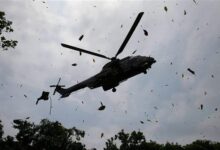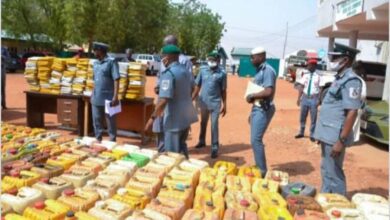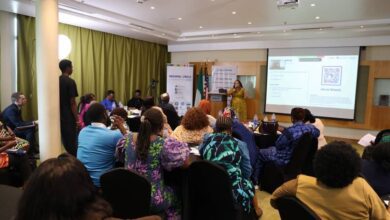FG Open To Partnership With Organisations On Food Security

The Federal government said it is open to partnership with both Government and Non- non-governmental organizations (NGOs) that are ready to join in making food security a reality in Nigeria.
The Permanent Secretary in the Ministry of Agriculture and Food Security, Dr. Ernest Umakhihe, disclosed this on Monday in his goodwill message at the Climate Change workshop organized by the Organization of African Instituted Churches ( OAIC) for media practitioners in Abuja.
TheFact Daily reports that the OAIC, Nigerian region is an ecumenical body that brings together all African-founded or instituted churches (AICs) to worship in our unique African tradition and philosophies into our mode of worshiping the triune God.
The Permanent Secretary who was represented by a Deputy Director in the Department of Agricultural Land, Climate Change Management Services), Dr. Micheal Adebgboye, said the workshop will help in the area of climate change adaptation to address the growing challenges of food security in the country.
He added that the ministry has been mandated to ensure food security through proper attention to the development of crop and livestock production.
“ it is also expected of the ministry to stimulate agricultural employment and services, promote the production and supply of raw materials to Agro-allied industries, provide markets for the products of the industrial sector, generate foreign exchange, and aid rural socio-economic development throughout the country. This enormous mandate is facing a big challenge of climate change that is not affecting only agriculture but other areas of life as well.
“I want you to know that the federal government is doing everything possible to ensure that there is food on the table of Nigerian citizens.
“ Let me assure you that the Federal Ministry of Agriculture and Rural Development is up and doing with the pursuit of its mandate of ensuring food security for the country. Equally, we will not hesitate to partner with either government or non-governmental organizations that are ready to join us in making good security in Nigeria a reality.
A Professor in Agric Economics from the Department of Economics, Afe Babalola University, Ado Ekiti, Samuel Igbotayo said climate change is real and there should be no doubt about it.
He added that Nigeria will remain poor if the effects of climate change are not put in check.
“The thing is, in climate change there are losers and there are gainers but if we fail to address it now, what we hope to get now, we will lose far much because of the severity of loss and damage that will continue to impact on the global economy”.
“Nigeria, like other countries in West Africa, has been impacted severely by climate change. The nation’s climate profile features vulnerability in the northern and southern agro-ecological systems. In the former, increasing desertification and recurrent droughts undermine people’s livelihoods and well-being.
“In the latter, soil erosion, and floods, as well as rising sea levels pose serious challenges to policymakers. In order to address the impact of climate change, Nigeria has embraced both climate mitigation and adaptation strategies, with positive outcomes.
The Professor said there need for farmers to be provided with adequate funding.
“The issue of food sustainability, food security. Well, food security embraces every form of activity aimed at increasing availability, accessibility, and affordability as the major pillars of food and nutrition security.
“So why we need to do is to mobilize farmers with sufficient resources so that they can be able to access inputs at affordable prices so that they can also assist agricultural productivity and in the process raise farmers income and ensure adequate food and nutrition security,” he said.
The Regional Secretary, of OAIC, Dr. Victor Ivoke said the workshop aims to equip media practitioners with necessary tools that would aid in effect reportage on climate change and its impact on smallholder farmers.
“The best way to approach this is to get journalists involved. Most times you don’t hear about it except when there is a disaster. If there is food in south East that is where they will focus immediately the flood stops nobody talks about it. Nobody goes back to know how those people are surviving. And then there is a possibility of another flood, nobody goes to warn them. Nobody to ask the government what they will do in years to come.
“So we say, it is important to get journalists who have hands on this taking it as their beats even if it means going out of the call of duty but to make sure that this thing that affects and threatens all of us is brought to national consciousness. The only way to do it is to have this meeting with you. Tell you have we know, get experts to talk to all of us then we commit to bringing this knowledge and information to the people and government.
“…so as religious organizations, we’re not just concerned about preaching salvation those are nice. Those are beautiful and that’s the reason religious organizations exist, but we know that times are evolving, and development cuts across all spectrums of life. Now we’re going into what is called development theology. In development theology, you also talk about how your preaching and your faith affect the space of development If not, you’ll be preaching to hungry people. And when you’re preaching to the hungry congregation, you are on your own and whatever you say does not make meaning.
He added that,” so religious organizations have come to this understanding and we are trying to find ways to be partners in progress, development partners, and that is talking about food security. We know most farmers, and most of our members are from especially in the rural areas. There are smallholder farmers and peasant farmers. Yet, it is these peasant farmers that feed the greater number of the population. About 88. 8 percent of farmers in Nigeria are peasant farmers yet they are the ones that bring the food we eat in the cities.
“So if we don’t get concerned about their plights when they’re going through climate change, what adaptive measures they have to use, communicating this in the language that they all understand ..we can’t afford to eat they won’t be able to go to the farm again. So it is important that as a religious organization, we realize this, that’s the only one we can do. That’s the way we can show that we are concerned. That’s how to show that we care about our people,” he said.






